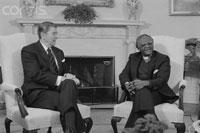This Day in History: December 7, 1984
Additional Date: December 7, 1984
Archbishop Desmond Tutu is known around the world for his vigorous stand against injustice. More particularly, he is renowned for his involvement in the fight against apartheid. This included his support for economic sanctions to be imposed on South Africa. While many European countries had boycotted South Africa both economically and culturally, the United States had not. During the Reagan administration, a policy of constructive engagement with the apartheid government was followed, in which the USA continued its economic investment in South Africa. This policy also involved the USA vetoing any decision in the United Nations General Assembly to isolate South Africa economically. The British Prime Minister at the time, Margaret Thatcher, also advocated a similar policy with regard to apartheid. In response to Ronald Reagan's actions, Desmond Tutu left for the USA on 7 December 1984, hoping to promote an economic boycott with the aim of bringing the apartheid regime to an end. In his speech on Capitol Hill, Desmond Tutu asserted that the policy of constructive engagement was "immoral, evil and un-Christian". This was reiterated by a vast number of Americans who called for the businesses in the United States to end their economic support of the South African government. These calls were initially unheeded, but by 1986, the Comprehensive Anti-Apartheid Act was passed. This anti-apartheid legislation brought an end to the policy of constructive engagement. Desmond Tutu has been credited with having made this possible through his interaction with the Reagan administration.
